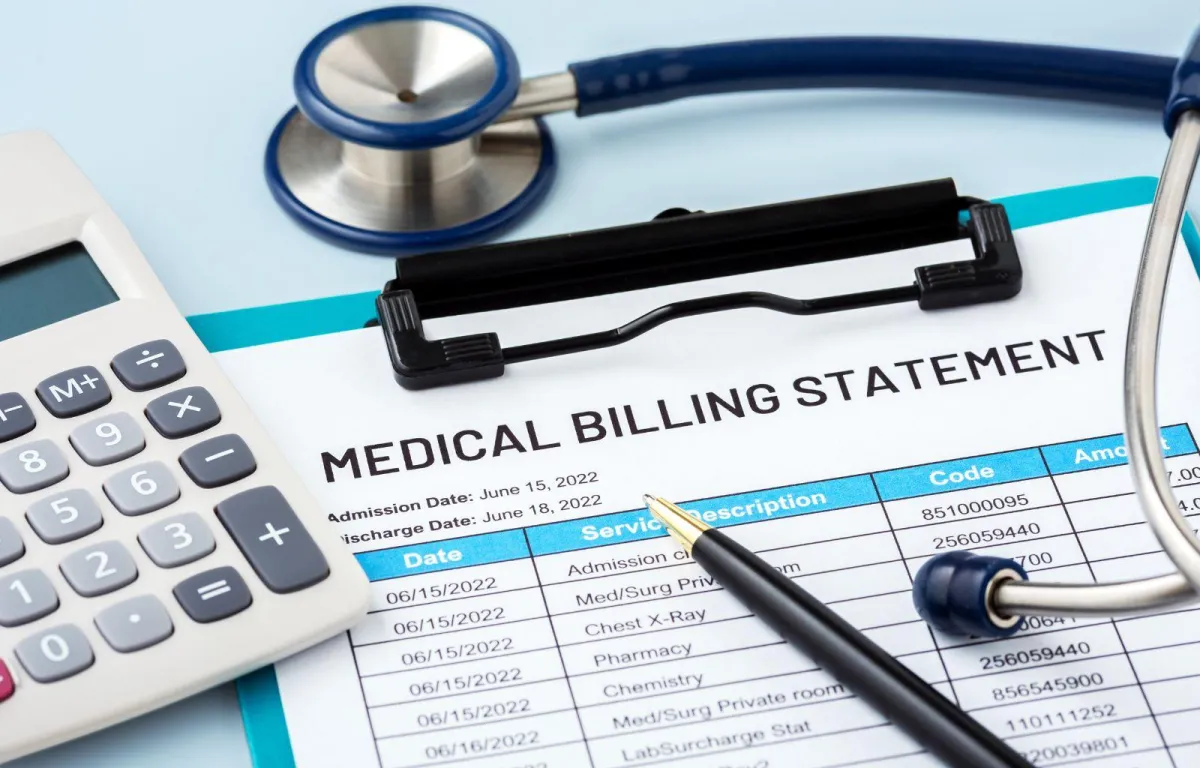Medical Debt Relief
An unexpected accident, emergency surgery, or hospital stay can leave you facing overwhelming medical bills. According to the Consumer Financial Protection Bureau (CFPB), medical debt is the most common type of debt appearing on Americans’ credit reports. Even people with health insurance can struggle with high deductibles, surprise bills, or denied claims that create long-lasting financial strain.
5-Star Reviews!
Don’t Let Medical Debt Take Over Your Life
Unlike secured debts such as mortgages or auto loans, medical debt is unsecured, meaning it isn’t tied to property. That can make it easier to negotiate with providers, but it also means unpaid bills are often sold to collection agencies. Once in collections, they can damage your credit score and increase financial stress. The good news is that you have options. At Debt Support National, we work with individuals and families to explore solutions such as debt settlement, consolidation, or repayment programs that address medical debt head-on. Our goal is to help you regain control of your finances without sacrificing the care you need.
The Most Common Sources of Medical Debt
Medical debt can arise from many areas of the healthcare system. The most frequent sources include hospital stays, emergency care, and diagnostic testing. High deductibles, coinsurance, and copayments make these bills difficult to manage, especially when care is unexpected. Here’s a breakdown of where medical debt most often comes from in the United States:
| Source of Medical Debt | Percentage of Cases* | Notes |
|---|---|---|
| Hospital stays & surgeries | 24.8% | Major driver due to inpatient costs |
| Diagnostic tests & imaging | 21.7% | Includes MRIs, CT scans, lab work |
| Emergency room visits | 18.9% | Often involve multiple provider charges |
| Doctor & specialist visits | 14.8% | Includes routine and follow-up care |
| Outpatient procedures | 10.9% | Same-day services with facility fees |
| Dental treatment | 4.3% | Limited coverage from many insurance plans |
| Prescription medications | 3.7% | Rising drug costs impact chronic patients |
| Long-term care/nursing facilities | 0.8% | Rarely covered in full by insurance |
*Based on consumer credit reports and healthcare cost studies (CFPB and HHS).
Even small bills can accumulate when patients receive multiple services. A single emergency visit can generate thousands of dollars in charges, with balances often exceeding insurance coverage.
How To Manage Medical Bills Before They Spiral
If you’re already struggling with healthcare costs, there are proactive steps you can take to prevent your bills from turning into collections.
Verify your insurance coverage
Compare your bill with your Explanation of Benefits (EOB) from your insurer. Billing errors are extremely common, with studies estimating that up to 80% of medical bills contain at least one mistake. If you see charges that don’t match your EOB, dispute them immediately.
Negotiate with providers
Hospitals and clinics would rather receive partial payment than send your account to collections. Ask about financial hardship discounts or charity programs. Always get any agreement in writing.
Set up a repayment plan
Many providers allow monthly installments with little or no interest. Paying consistently, even in smaller amounts, protects your credit score and avoids collections.
Use a medical billing advocate
Billing advocates specialize in reviewing invoices, identifying errors, and negotiating with providers. Their expertise can save you both time and money, especially for complex cases.
Seek financial assistance
Depending on your income and situation, you may qualify for:
Medicaid (for low-income households)
Hospital charity care (required under the Affordable Care Act (ACA) for nonprofit hospitals)
State or local programs
Nonprofit organizations for chronic illnesses such as cancer or diabetes
Religious or community-based charities
Avoid credit cards when possible
Turning medical bills into credit card debt introduces high interest rates and may eliminate eligibility for hospital payment plans. This should only be considered if no other option exists.

The Impact of Medical Debt
Medical debt doesn’t just hurt your finances. It affects your health, relationships, and quality of life. Studies have found that:
Nearly 1 in 3 adults in the U.S. has some form of medical debt.
Balances often range between $1,000 and $5,000, though hospital stays can be far higher.
Stress and anxiety caused by debt often lead to delayed or skipped medical care.
Many families postpone life milestones such as buying a home or starting a family because of unpaid medical bills.
Conflicts within households are common, with debt straining relationships.
In severe cases, individuals consider bankruptcy under Chapter 7 or Chapter 13 of the U.S. Bankruptcy Code. While this can discharge certain medical debts, it should be treated as a last resort due to long-term credit consequences.
How To Avoid Future Medical Debt
While not all medical expenses can be predicted, you can reduce the risk of debt with proactive planning.
Understand your insurance coverage
Before a scheduled procedure, confirm what your insurance covers. Ask about deductibles, copays, and whether all providers involved are in-network.
Keep organized records
Store every bill, EOB, and communication with providers. Having documentation makes it easier to challenge errors and prove coverage.
Review every bill carefully
Don’t assume charges are accurate. Confirm provider names, service dates, and itemized costs. Question anything you don’t recognize.
Ask about costs and payment options upfront
When possible, request a good faith estimate of charges before care. Hospitals often provide estimates and may allow installment payments from the beginning.
Explore financial aid and charity programs early
Nonprofit hospitals are required by law to offer financial assistance. Apply before procedures when possible to avoid surprise balances.
Use tax-advantaged accounts when possible
If available, contribute to a Health Savings Account (HSA) or Flexible Spending Account (FSA). These accounts can help cover out-of-pocket medical costs with pre-tax dollars.
Avoid early credit card use
Paying with a credit card right away can remove eligibility for hospital payment plans. Use this only as a last resort.
The Law Is On Your Side for Out-of-Network Charges
For years, patients were blindsided by “surprise bills” after receiving care at in-network hospitals but being treated by out-of-network providers.
The No Surprises Act, effective January 1, 2022, provides important protections:
Out-of-network providers at in-network facilities cannot balance bill patients for covered emergency and ancillary services.
Providers must give good faith estimates of charges to uninsured or self-pay patients.
Patients can use a federal dispute resolution process if billed substantially more than the estimate.
Protections apply to individuals with private or employer-sponsored insurance. (Medicare and Medicaid already prohibit balance billing under federal rules.)
Be cautious: Some providers may present a “Surprise Billing Protection Form” asking you to waive your rights. Never sign without reviewing carefully. If you feel pressured, write that you are “signing under duress” and keep a copy for dispute. Violations can be reported through the federal hotline.


Medical Debt Relief Options with Debt Support National
DSN offers tailored solutions to help clients resolve medical debt:
Debt Settlement – Negotiating with creditors or collections agencies to reduce the balance owed in exchange for a lump-sum or structured settlement.
Debt Consolidation – Combining multiple bills into one manageable payment, sometimes with lower interest.
Financial Counseling and Advocacy – Providing strategies to handle medical billing, avoid errors, and prevent future debt.
Every situation is unique. Our role is to review your finances, communicate with providers, and create a plan that helps you resolve debt without sacrificing your health or future.
See Our Reviews
Take the First Step Toward Relief
Medical debt doesn’t have to control your life. With the right support, you can protect your credit, reduce your balances, and move forward with confidence. Debt Support National has years of experience helping Americans resolve unsecured debt, including overwhelming medical bills. If you are struggling with healthcare costs, our team is ready to advocate for you. Contact us today for a free consultation. The sooner you act, the sooner you can focus on what really matters; your health and your future.
Frequently Asked Questions About Medical Debt Relief
What is the statute of limitations on medical debt, and why does it matter?
The statute of limitations is the time period creditors or collectors have to sue you in court for unpaid debt. For medical bills, it varies by state, usually between 3 and 10 years depending on whether the debt is treated as a written contract, oral agreement, or open-ended account. For example, in California the limit for written contracts is 4 years, while in New York it’s 6 years. If your medical debt is older than your state’s statute of limitations, a collector cannot legally sue you to enforce payment. However, the debt may still remain on your credit report for up to 7 years, so it can still affect your creditworthiness.
Should I request an itemized medical bill before paying?
Yes. Always ask for an itemized bill from your hospital, clinic, or provider. Research shows that a large percentage of medical bills contain errors, such as duplicate charges, incorrect procedure codes, or services you never received. For example, patients often find multiple charges for diagnostic tests or medications that were never administered. By carefully reviewing the itemized list and comparing it to your Explanation of Benefits (EOB) from your insurer, you can catch mistakes and dispute charges before paying.
How long do I have to dispute a medical debt with a collection agency?
Under federal law enforced by the Consumer Financial Protection Bureau (CFPB), you have 30 days from the date you are first contacted by a debt collector to dispute a medical bill you believe is incorrect. Once you submit a written dispute, the collector must provide proof of the debt in writing before continuing collection activity. If you do not dispute within 30 days, the debt is legally assumed to be valid, even if errors exist. Acting quickly is critical to protecting your rights.
Can hospitals or nonprofit providers forgive medical debt?
Yes. Many hospitals, especially those classified as nonprofit organizations, are legally required under the Affordable Care Act (ACA) and IRS 501(r) regulations to maintain charity care or financial assistance policies. These programs can reduce or even eliminate bills for patients who meet income and household size criteria. Each hospital sets its own guidelines, but patients can often qualify if their income falls below a certain percentage of the federal poverty level. Applying for these programs before your debt is sent to collections gives you the best chance of approval.
How does the No Surprises Act protect me from unexpected out-of-network charges?
The No Surprises Act, effective January 1, 2022, protects most patients from surprise medical bills in emergencies or when treated by an out-of-network provider at an in-network hospital. It prohibits balance billing in these situations and caps your responsibility at the in-network rate. The law also requires providers to give good faith estimates of costs to uninsured or self-pay patients before treatment. If you are billed far more than the estimate, you can use the federal dispute resolution process. Be cautious of any forms asking you to waive these rights, read carefully before signing.
What is the best strategy to overcome medical debt?
There are several proven strategies to manage or eliminate medical debt, depending on your situation:
• Debt settlement – Negotiating directly with providers or collectors to reduce your balance in exchange for a lump-sum or structured payment.
• Debt consolidation – Combining multiple medical accounts into a single monthly payment, often with a lower interest rate.
• Financial assistance programs – Applying for hospital-based charity care, Medicaid, or nonprofit aid.
Working with a professional debt relief company like Debt Support National ensures that you don’t face this process alone. We help clients review bills and structure repayment in a way that protects both your health and financial stability.

Helping you achieve financial success with expert guidance and personalized strategies.
Opening hours
Mon - Fri : 9:00 AM - 7:00 PM
Saturday: 9:00 AM - 6:00 PM
Sunday: Closed
Disclaimer : Debt Support National is an independent website created to help users find a solution to their debt problems. Our service is free to use and you are under no obligation to accept any of the recommendations you receive. Calls may be recorded for training and quality purposes. Please check with your service provider for details. On completion of our form, we will introduce you to one of our authorised Debt Solutions provider. We use the contact details you have given us on the form to make this introduction. An adviser will contact you by telephone. During that call, the expert adviser will discuss your options in more detail to see if they can help.
Pulse Digital LLC does not directly administer debt management services. It is ultimately up to you to determine whether the company that we may introduce you to are appropriate for your situation.
Pulse Digital LLC is paid for providing marketing services to selected Debt Management companies who are legally appointed to manage debt adjustment services. They have no affiliation with your Creditors. They will offer free initial consultations with no further obligation.
We use cookies to give you the best experience. By using our website, you agree to our use of cookies in accordance with our cookie policy. Names and pictures associated with client testimonials are not real in order to protect the privacy of all clients.
www.deptsupportnational.com is owned by Pulse Digital LLC. Registered Address: 447 Broadway, 2nd Floor, 754, New York, NY 10013
© Debt Support National. 2026. All Rights Reserved.







